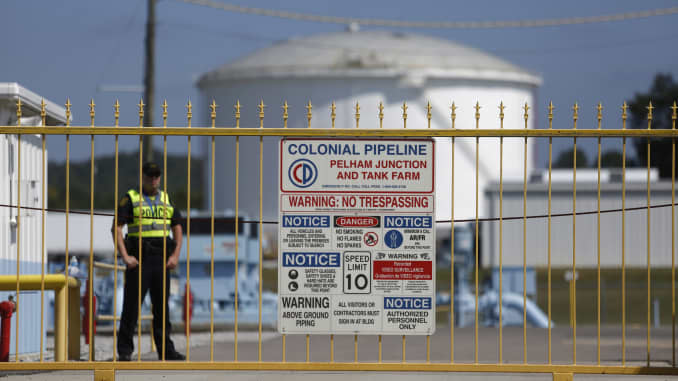
A police officer stands guard inside the gate to the Colonial Pipeline Co. Pelham junction and tank farm in Pelham, Alabama
WASHINGTON, May 10 (NNN-AGENCIES) — The US government issued emergency legislation on Sunday after the largest fuel pipeline in the US was hit by a ransomware cyber-attack.
The Colonial Pipeline carries 2.5 million barrels a day – 45% of the East Coast’s supply of diesel, gasoline and jet fuel.
It was completely knocked offline by a cyber-criminal gang on Friday and is still working to restore service.
The emergency status enables fuel to be transported by road.
A total of 18 states have been granted a temporary hours of service waiver for transporting gasoline, diesel, jet fuel and other refined petroleum products.
They are Alabama, Arkansas, District of Columbia, Delaware, Florida, Georgia, Kentucky, Louisiana, Maryland, Mississippi, New Jersey, New York, North Carolina, Pennsylvania, South Carolina, Tennessee, Texas and Virginia.
Experts say fuel prices are likely to rise 2-3% on Monday, but the impact will be far worse if it goes on for much longer.
Independent oil market analyst Gaurav Sharma said there is a lot of fuel now stranded at refineries in Texas.
“Unless they sort it out by Tuesday, they’re in big trouble,” said Sharma. “The first areas to be impacted would be Atlanta and Tennessee, then the domino effect goes up to New York.”
He said oil futures traders were now “scrambling” to meet demand, at a time when US inventories are declining, and demand – especially for vehicular fuels – is on the rise as consumers return to the roads and the US economy attempts to shake off the effects of the pandemic.
The temporary waiver issued by the Department of Transportation enables oil products to be shipped in tankers up to New York, but this would not be anywhere near enough to match the pipeline’s capacity, Sharma warned.
Multiple sources have confirmed that the ransomware attack was caused by a cyber-criminal gang called DarkSide, who infiltrated Colonial’s network on Thursday and took almost 100GB of data hostage.
After seizing the data, the hackers locked the data on some computers and servers, demanding a ransom on Friday. If it is not paid, they are threatening to leak it onto the internet.
Colonial said it is working with law enforcement, cyber-security experts and the Department of Energy to restore service.
On Sunday evening it said that although its four mainlines remain offline, some smaller lateral lines between terminals and delivery points are now operational.
“Quickly after learning of the attack, Colonial proactively took certain systems offline to contain the threat. These actions temporarily halted all pipeline operations and affected some of our IT systems, which we are actively in the process of restoring,” the firm said.
“We are in the process of restoring service to other laterals and will bring our full system back online only when we believe it is safe to do so, and in full compliance with the approval of all federal regulations.” — NNN-AGENCIES
